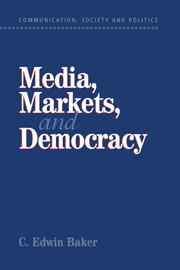Book contents
- Frontmatter
- Contents
- Preface
- PART I SERVING AUDIENCES
- 1 Not Toasters: The Special Nature of Media Products
- 2 Public Goods and Monopolistic Competition
- 3 The Problem of Externalities
- 4 The Market as a Measure of Preferences
- 5 Where To? Policy Responses
- PART II SERVING CITIZENS
- PART III AN ILLUSTRATION: INTERNATIONAL TRADE
- CONCLUSION
- Notes
- Index
2 - Public Goods and Monopolistic Competition
Published online by Cambridge University Press: 10 December 2009
- Frontmatter
- Contents
- Preface
- PART I SERVING AUDIENCES
- 1 Not Toasters: The Special Nature of Media Products
- 2 Public Goods and Monopolistic Competition
- 3 The Problem of Externalities
- 4 The Market as a Measure of Preferences
- 5 Where To? Policy Responses
- PART II SERVING CITIZENS
- PART III AN ILLUSTRATION: INTERNATIONAL TRADE
- CONCLUSION
- Notes
- Index
Summary
PRODUCTION OF A PUBLIC GOOD
As discussed in Chapter 1, copyright is a form of propertization in the economically peculiar realm of communications. Propertization of traditional commons, for example, where sheep or cattle grazed, supposedly solved problems of overuse leading to subsequent under-production. Owners have an incentive to husband their property to create maximum value. Copyright, however, cannot be expected to be such a perfect solution precisely because of the public-goods aspect of media content. At least without adequate price discrimination, market-based firms predictably provide inadequate amounts of those goods whose use is nonrivalrous. Private firms will not provide some media content that an audience wants – content whose value as measured by willingness to pay is greater than its cost. In these cases, no price exists at which the media product can be profitably sold even though its value to potential consumers is greater than the cost of supplying them. Another routine feature of such goods is underproduction. In order to cover the cost of a media product, it must be sold at a price that prevents some people from purchasing, even though they would be willing to pay at least the marginal cost necessary to provide them with the media content.
A simple example based on three hypothetical media products in a two-person society, summarized in Table 2.1, can illustrate these problems. For each product, the cost of producing the first copy is assumed to be 10, while reproducing and distributing a copy to person B has a minimal cost, here assumed to be 1.
- Type
- Chapter
- Information
- Media, Markets, and Democracy , pp. 20 - 40Publisher: Cambridge University PressPrint publication year: 2001



